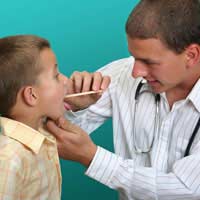Lisps

Lisps are speech disorders in which individuals are unable to produce a specific speech sound (or sounds). Many children lisp naturally as they learn to speak and produce specific sounds and it is common for children to grow out of a slight lisp. After about five years of age, however, lisping is no longer considered “normal” and should be investigated by a speech professional if it is keeping a child from communicating clearly or causing the child distress.
Types of Lisps
There are four main types of lisps. Interdental lisps occur when individuals put their tongues between their teeth when attempting to make an “s” or “z” sound but instead push air outwards and create a “th” sound. This is often considered the most common type of lisp. Dentalised lisps occur when individuals put their tongues against their front teeth and push air outwards, result in a kind of muffled pronunciation of certain sounds. Lateral lisps occur when individuals put their tongues to the roof of their mouths and push air outwards, making a “slushy” sound. Finally, palatal lisps occur when individuals allow the mid-section of their tongues to touch the soft palate of their mouths. A “hy” sound tends to result.Investigating Lisps
Some lisps, interdental and dentalised lisps, do naturally occur in younger children. Any child exhibiting these types of lisps should be allowed to progress as normal until about their fourth or fifth birthday. If, after this time, the lisp still occurs then an investigation by a trained speech therapist or pathologist should be sought. Lateral lisps and palatal lisps are not naturally occurring in child speech development and should be investigated when first recognised.Assessing Lisps
Lisp assessments are generally carried out by speech and language therapists, speech therapists or speech pathologists. During an assessment the individual’s mouth may be examined (to see if there is a physiological reason that sounds can not be made) and the individual’s language and speech abilities will be observed and investigated. It may be that children who have trouble producing certain sounds actually have another speech disorder that may be diagnosed at this time.Treating Lisps
Treating lisps in children usually involves short-term speech therapy and is generally successful. Speech therapy sessions include a wide variety of activities and speech drills, though what specifically happens in any given session will depend upon many variables. The length of the therapy session (usually between a half hour and one hour), the location of the therapy session (whether at home, school or a private facility), the age of the child involved, whether the therapy session is private or involves a group, and the type of lisp that is being treated will all affect the content of these sessions.During these sessions the child will be taught the isolated sound that he or she is having trouble with. When this sound is mastered, the child will then learn to say the sound in syllables, then words, then phrases and then sentences. When a child is able to speak a whole sentence without lisping, attention is then focused on making correct sounds throughout natural conversation. Towards then end of the course of therapy, the child will be taught how to monitor his or her own speech, and how to correct as necessary.
Further Information on Lisps
Many different organisations exist to support individuals with speech disorders in the United Kingdom. Talking Point (www.talkingpoint.org.uk) is just one of the organisations that should be able to provide further information on lisping. Medical professionals and speech therapists will also likely to provide further information and advice on lisps.- Developmental Disabilities and Speech Difficulties
- What is Backing Disorder?
- Coping With Tourettes Syndrome
- Orofacial Myofunctional Disorders
- What is Rett Syndrome?
- Questionnaire: Does My Child Have a Speech Disorder?
- Expressive Language Disorder
- Receptive Language Disorders
- Children's Speech Sound Disorders
- All About the Voice Disorder Spasmodic Dysphonia
- Specific Difficulties in Producing Sounds
- Stammering
- Voice Disorders
- Dyspraxia
- Apraxia of Speech
- Speech Delay
- Phonemic Disorders & Speech Impediments
- Dysarthria
- Dysprosody
- Selective Mutism
- Language Based Learning Disabilities
- Articulation Disorders
- Cluttering
- Aphasia


Re: The Lidcombe Program
My 3 year old has started to stammer about 5 weeks ago and has progressed very fast and now it affect every word she pronounces and I am…
Re: Child Abuse and Speech Disorders
I stopped talking to my dad in my normal voice when I was in grade 1 after he hit me because I couldn’t understand my…
Re: New Earpiece to Help With Stammering
I am interested in being assessed for the use of the SpeechEasy hearing device and would be grateful if someone could…
Re: The Lidcombe Program
I don’t know what else to do ..
Re: New Earpiece to Help With Stammering
I have a Stammer and have always struggled with my speech and I think this would really help me and so many others.
Re: The Lidcombe Program
Sir I only stutter when speaking to others. Not when, I speak to myself can you tell me what's the problem.
Re: The Lidcombe Program
I am 23 years I am supering from stammer please how can I get vaccine for ti
Re: Expressive Language Disorder
I have a lot to ask . Please reach out. Thank you
Re: The Lidcombe Program
My age is 32...when IAM speaking difficulty to say word...IAM disappointed in my life only reason is stammring..plz help me...
Re: The Lidcombe Program
Is there any advice for a child who has been really forward with his speech since 2 he has stung sentences together so clearly. He has now…